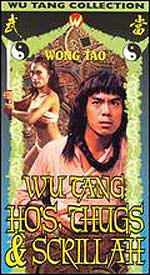 Kao Pao Shu was one of the few women directors to direct kung fu action films such as Lady with a Sword (Feng fei fei, 1971), The Desperate Chase (Shui ming qiang, 1973) & The Master Strikes (Tong tian lao hu, 1980). In the previous decade or so she had been a film star in such films as Vengeance is a Golden Blade (Fei yan jin dao, 1969), The Golden Sword (Long men jin jian, 1969), & the "Monkey Goes West" trilogy beginning with The Land of Many Perfumes (Nu er guo, 1968), among many others.
Kao Pao Shu was one of the few women directors to direct kung fu action films such as Lady with a Sword (Feng fei fei, 1971), The Desperate Chase (Shui ming qiang, 1973) & The Master Strikes (Tong tian lao hu, 1980). In the previous decade or so she had been a film star in such films as Vengeance is a Golden Blade (Fei yan jin dao, 1969), The Golden Sword (Long men jin jian, 1969), & the "Monkey Goes West" trilogy beginning with The Land of Many Perfumes (Nu er guo, 1968), among many others.
If one hopes for a kinder gentler wuxia from a woman director, forget it. Her film Bandits, Prostitutes, & Silver aka Battle of Shaolin (Bo ming, 1978) is more cruel & relentlessly downbeat than most historical kung fu adventures.
This film had its very first American distribution back in the 1970s as The Damned & quite recently reappeared under the dubious new title Wu Tang Ho's, Thugs, & Scrillah. Even more dubiously, one distributor re-packaged it as the third part of a trilogy, Snake & the Eagle's Shadow III, though unrelated to the original Jackie Chan film or its faux sequel, though Part II does also star Don Wong aka Don Wang Tao, who plays the hero of Battle of Shaolin.
It's not a tale of Shaolin & really the best title anyone has put on it has been Bandits, Prostitutes, & Silver. The film as commonly available has one unforunate quality: It is not in the original Mandarin with subtitles. As voice dubbing goes, however, it's not hideously done, though the sound FX are of the high-silly variety, where just moving one's arm breaks the sound barrier & all slaps & kicks & punches make pretty much the same sound.
The recent version distributed as Battle of Shaolin is 82 minutes long, losing a few minutes to the cutting room floor. If I could find it uncut & in the original language I would delight in seeing it again, as it's worth it.
At least it's full widescreen; it's a fairly good even if not perfect transfer. Too often these old dubbed kung fu films are "pan & scan" so don't merely lose the aural qualities of the original production by being dubbed, but also lose their visual qualities by being cropped on both sides. This one's actually very reasonable.
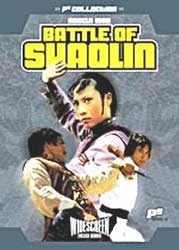 Little Rabbit (Lin Hsiao Hu) is an annoying child who wants to become a kung fu master someday. He makes a living as a beggar by means of singing songs at roadside inns (the dubbed song is new lyrics to the tune of "This Old Man"). When not begging, he hangs out with a wagoneer who is a great fighter & whip master, who gives the kid kung fu lessons. Little Rabbit (Lin Hsiao Hu) is an annoying child who wants to become a kung fu master someday. He makes a living as a beggar by means of singing songs at roadside inns (the dubbed song is new lyrics to the tune of "This Old Man"). When not begging, he hangs out with a wagoneer who is a great fighter & whip master, who gives the kid kung fu lessons.
Little Rabbit gets several scenes including one good Bruce Lee Impersonation sequence when he successfully beats up a bad guy despite their size difference. He gives a squeaky kid version of Bruce's threatening yell so many times that soon I was thinking, "Kill that brat & stop his squealing."
Fortunately the kid is just a decorative side-character & not important to the tale, which is about the wagoneer Shang Li (Don Wong).
Shang Li is hired, with wagon, by Sparrow (Man Kong-lung), a handsome swordsman who is usually seen carrying a finch in a cage. He's a bandit from Blue Mountain Region. Despite his skill & good looks, he's not a hero. Shang Li against his good nature agrees to let his wagon be used in a scheme of banditry, because he needs to raise money quickly in order to buy his sweetheart out of her bordello contract, before a villainous guy buys the contract first.
Shao Choy is sadly abused by her snarky money-grubbing momma-san who would be as happy to sell the girl's contract to a fiend as to her true love, which ever one arrives first with money in hand. The sizeable fee Sparrow offers Shang Li for use of his wagon in transporting stolen silver is a bit more than needed to liberate Shao Choy.
He naively thought he could help out in the theft without having to hurt anyone, but Sparrow does not intend to leave witnesses. To save the lives of fellow wagoneers, Shang Li turns on the swordsman & after a good fight kills him, & feels bad about it, but what else could he do. The two men who were being robbed took off in a hurry-scurry, one certain that Shang Li robbed & nearly killed them, the other just as certain Shang Li saved their lives & should not be too hastily assumed to have become a bandit.
But he's definitely become a bandit out of desperation to liberate his sweetheart. He takes the chest of silver taels into the woods & while being gleeful over his luck, the Three Scar Gang of bandits arrive to take it away from him if they can, providing the umpteenth reasonable excuse for kung fu action.
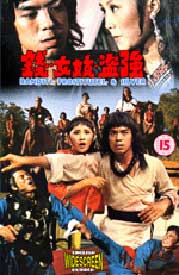 Angela Mao Ying plays the bandit chieftainess. Her gang was supposed to waylay the silver shipment in transit had not Sparrow gotten ahead of them. Her gang has a rule never to kill, because, as she explains, "We're thieves, not murderers." So even though they're criminals wanted by the law, they tend toward chivalry.
Angela Mao Ying plays the bandit chieftainess. Her gang was supposed to waylay the silver shipment in transit had not Sparrow gotten ahead of them. Her gang has a rule never to kill, because, as she explains, "We're thieves, not murderers." So even though they're criminals wanted by the law, they tend toward chivalry.
The character Angela Mao plays is quite wonderful. It's only a "guest appearance" yet we learn a good deal about her history & motivations & attitudes. She's a foot-bound woman who wears little "lotus" shoes, but of a special kind that have buzz-saws in them, to add to the destructiveness of her kung fu kicks. It takes forever for her character to get around to fighting anyone, but when she finally acts, it's pretty cool, with or without turning on her buzz-saws.
As she fights on her lotus-feet, Granny Artemis asked, "I thought women who were foot-bound couldn't walk." I shrugged. "That's the usual assumption. Maybe it's an exaggeration."
In a film with a woman directing but with darned few themes or attitudes that could be assumed to be exclusive to a woman director, this interest in the possibility of a kicks-ass-heroic woman whose feet had been bound is one of the few elements a male director may never have thought to investigate.
Note, however, that the co-scriptwriter with Kao Pao Shu is Ni Kuang, & they make a fine pair for what might be regarded at least partially feminist creativity. He's a very fine wuxia writer, whose large output encompasses many swordswomen characters, including in such near classics as Clans of Intrigue (Chu liu xiang, 1977) & the above-mentioned Lady with a Sword. He wrote the original & influential classic The One Armed Swordsman (Bao biao, 1969) in which it is a swordswoman who lops off Jimmy Wu Yang's arm.
Ultimately, however, powerful fighting-women are de rigueur for kung fu cinema, & originates somewhere other than feminist sensibility. It's just exciting.
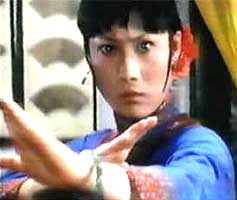 After Shang Li proves impressive as a fighter, & after Angela as the gangleader gets sentimental to realize Chang Lee's motivation is love, she & her husband Three-Scars (Phillip Ko Fei), a renegade Shaolin monk, attempt to help him.
After Shang Li proves impressive as a fighter, & after Angela as the gangleader gets sentimental to realize Chang Lee's motivation is love, she & her husband Three-Scars (Phillip Ko Fei), a renegade Shaolin monk, attempt to help him.
By the by, the relationship between Three-Scars & his tough footbound wife is really something, & they very nearly steal the film from Don Wang Tao as star.
They're certainly richly enough drawn characters; they could've been the central characters of a film of their own; & the bits given of their background story is good stuff.
[SPOILER ALERT] The real villain is Pao Cheng-fang (first-rate player of villains, Lo Lieh), who hired Angela Mao's team of bandits to steal the silver that Pao's organization had been hired to protect while in transit. He's much worse than a double-dealer in business, however.
His henchman Mr. Wu or Hu Chu (Wong Hap), a goon always playing with ben-wah balls like Bogart in The Caine Mutiny (1954), handles most of Pao's darker business, while Pao keeps up a facade of honesty.
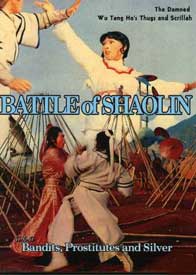 Wu was the go-between to hire Angela's gang. Pao's annoyed when she & her monk lover show up at his house to plead that all charges be dropped against Shang Li who only wanted enough money to liberate his sweety. Wu was the go-between to hire Angela's gang. Pao's annoyed when she & her monk lover show up at his house to plead that all charges be dropped against Shang Li who only wanted enough money to liberate his sweety.
Pao's unfriendly response is to murder his own conspirators with the most gruesome of kung fu weapons, using a rings-and-chain weapon in the cruelest manner imaginable.
Shang Li is horrified to learn of the fate of the good bandit couple & inclined to avenge them. Her followers offer Shang Li a chieftaincy, since they find themselves leaderless, but he refuses to join the outlaws, though he gives them the silver except what he needs to redeem Shao Choy. [END SPOILER ALERT]
Meanwhile back at the bordello, Wu has begun harassing the prostitutes while waiting for Shang Li, who arrives to beat the living daylights out of Wu's men, his empty hand skill against their many swords. The outcome of this extended series of duels & battles is so startling that the least said about it the better; you've got to see it.
After I spent a week watching old kung fu films that seemed to get awfuller & awfuller, it was a great relief to find this one, which I really liked. The film is surprisingly void of sentimentality & tells a doomful hard-hitting story (in every sense of the term hard-hitting).
The many fight scenes are given solid plot contexts rather than just happening for action's sake as in so many cheap-chop-sockies, & the story, as wuxia stories go, is sleek & original, rather than the usual convoluted batch of cliches. Anyone who likes this sort of film even a little would surely appreciate this one.
copyright © by Paghat the Ratgirl
|
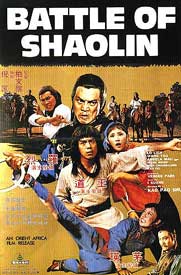




 Wu was the go-between to hire Angela's gang. Pao's annoyed when she & her monk lover show up at his house to plead that all charges be dropped against Shang Li who only wanted enough money to liberate his sweety.
Wu was the go-between to hire Angela's gang. Pao's annoyed when she & her monk lover show up at his house to plead that all charges be dropped against Shang Li who only wanted enough money to liberate his sweety.